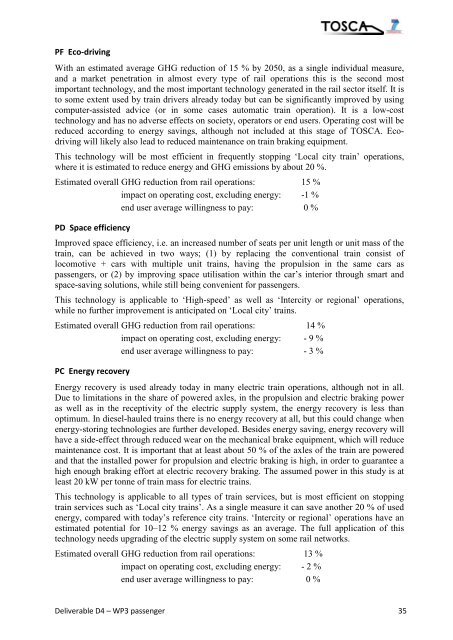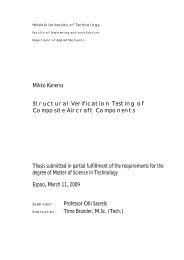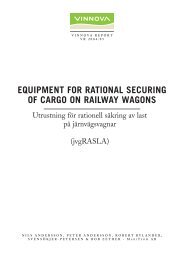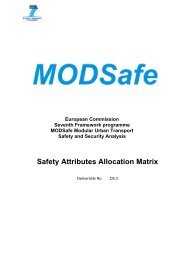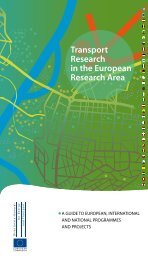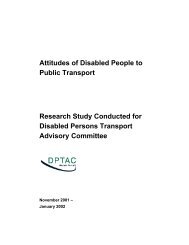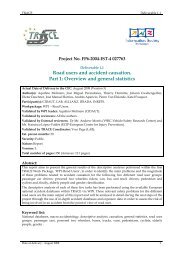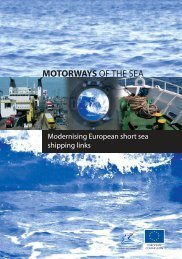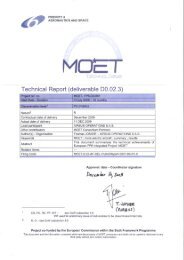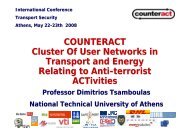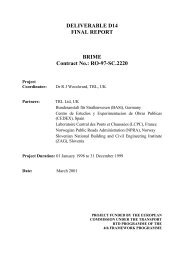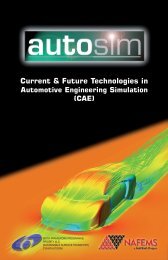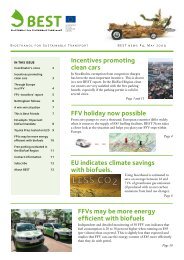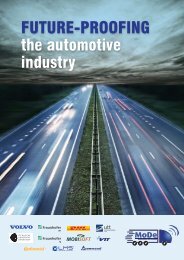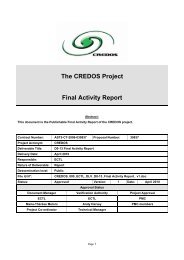WP3: Rail Passenger Transport - TOSCA Project
WP3: Rail Passenger Transport - TOSCA Project
WP3: Rail Passenger Transport - TOSCA Project
Create successful ePaper yourself
Turn your PDF publications into a flip-book with our unique Google optimized e-Paper software.
PF Eco-driving<br />
With an estimated average GHG reduction of 15 % by 2050, as a single individual measure,<br />
and a market penetration in almost every type of rail operations this is the second most<br />
important technology, and the most important technology generated in the rail sector itself. It is<br />
to some extent used by train drivers already today but can be significantly improved by using<br />
computer-assisted advice (or in some cases automatic train operation). It is a low-cost<br />
technology and has no adverse effects on society, operators or end users. Operating cost will be<br />
reduced according to energy savings, although not included at this stage of <strong>TOSCA</strong>. Ecodriving<br />
will likely also lead to reduced maintenance on train braking equipment.<br />
This technology will be most efficient in frequently stopping ‘Local city train’ operations,<br />
where it is estimated to reduce energy and GHG emissions by about 20 %.<br />
Estimated overall GHG reduction from rail operations: 15 %<br />
impact on operating cost, excluding energy: -1 %<br />
end user average willingness to pay: 0 %<br />
PD Space efficiency<br />
Improved space efficiency, i.e. an increased number of seats per unit length or unit mass of the<br />
train, can be achieved in two ways; (1) by replacing the conventional train consist of<br />
locomotive + cars with multiple unit trains, having the propulsion in the same cars as<br />
passengers, or (2) by improving space utilisation within the car’s interior through smart and<br />
space-saving solutions, while still being convenient for passengers.<br />
This technology is applicable to ‘High-speed’ as well as ‘Intercity or regional’ operations,<br />
while no further improvement is anticipated on ‘Local city’ trains.<br />
Estimated overall GHG reduction from rail operations: 14 %<br />
impact on operating cost, excluding energy: - 9 %<br />
end user average willingness to pay: - 3 %<br />
PC Energy recovery<br />
Energy recovery is used already today in many electric train operations, although not in all.<br />
Due to limitations in the share of powered axles, in the propulsion and electric braking power<br />
as well as in the receptivity of the electric supply system, the energy recovery is less than<br />
optimum. In diesel-hauled trains there is no energy recovery at all, but this could change when<br />
energy-storing technologies are further developed. Besides energy saving, energy recovery will<br />
have a side-effect through reduced wear on the mechanical brake equipment, which will reduce<br />
maintenance cost. It is important that at least about 50 % of the axles of the train are powered<br />
and that the installed power for propulsion and electric braking is high, in order to guarantee a<br />
high enough braking effort at electric recovery braking. The assumed power in this study is at<br />
least 20 kW per tonne of train mass for electric trains.<br />
This technology is applicable to all types of train services, but is most efficient on stopping<br />
train services such as ‘Local city trains’. As a single measure it can save another 20 % of used<br />
energy, compared with today’s reference city trains. ‘Intercity or regional’ operations have an<br />
estimated potential for 10–12 % energy savings as an average. The full application of this<br />
technology needs upgrading of the electric supply system on some rail networks.<br />
Estimated overall GHG reduction from rail operations: 13 %<br />
impact on operating cost, excluding energy: - 2 %<br />
end user average willingness to pay: 0 %<br />
Deliverable D4 – <strong>WP3</strong> passenger 35


